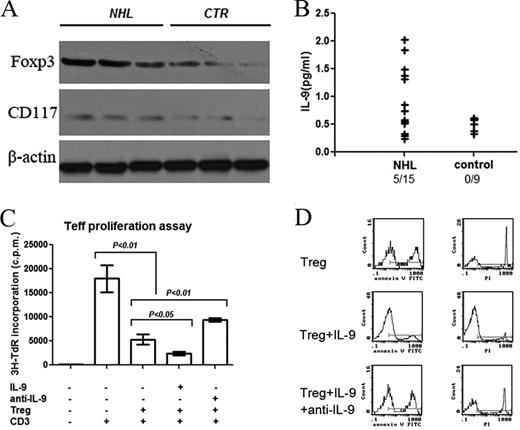Abstract
Abstract 4141
B-cell non-Hodgkin lymphoma (NHL) is a clonal expansion of neoplastic cells that may result in fatal outcomes. There is increasing evidence that regulatory T (Treg) cells have the potent ability to suppress host immune responses, thus preventing anti-tumor immune responses. Mast cells (MCs) are also currently receiving increased attention in tumor immunity. They promote tumor angiogenesis and tumor growth because of their properties as inflammatory cells. IL-9 is a key cytokine which can be produced by activated Treg cells and it is one of the most important MC growth factors. Additionally, MCs have been found to attract Treg cells infiltration indirectly in tumor microenvironment and induce IL-9 production by Treg cells. However, the precise mechanism by which Treg cells, MCs and IL-9 in immunosuppression of B-cell NHL remains to be determined. This study is aimed to elucidate the underlying interactions among Treg cells, MCs and IL-9 in immunosuppression of B-cell NHL.
Blood samples and tumor tissues were collected from 32 patients who were diagnosed with B-cell NHL for the first time at the Hematology Department in our hospital. Treg cells and MCs-related protein expressions in tumor tissues were examined by immunohistochemistry and Western-blot. IL-9 level in serum was measured by ELISA. A murine model of lymphoma was established by subcutaneous (s.c.) implantation of A20 mouse lymphoma cells (5°Á106) into the middle chest area of 6 week-old male BALB/c mice. Tumor-bearing mice received 100 μ g of anti-mIL-9 Ab or isotype control Ab via i.p. every other day, starting at day 7 when tumors reached 5 to 7mm in largest diameter. Mice were sacrificed at day 18 and blood samples and tumor draining lymph nodes were harvested at the same time for further study. IL-9 level in murine sera were also measured by ELISA. The expressions of Treg cells and MCs-related genes were examined by quantitative PCR. The impacts of recombinant murine IL-9 on Treg cells function and apoptosis were determined by H3-TdR incorporation method and FACS analysis. The effects of murine IL-9 on induction of bone-marrow-derived mast cells (BMMCs) from bone marrow and MC-related genes expression were examined by FACS and quantitative PCR. FITC anti-mouse FceRI alpha (+) and PE anti-mouse CD117 (+) cells were designated to be MCs.
More Foxp3+ Treg cells and CD117+ MCs were found in NHL tumor tissues. A significant up-regulation of Foxp3 and CD117 in protein level can also be observed in tumor tissues of NHL subjects (Figure 1A). Serum samples from patients with NHL contained increased levels of IL-9 in a higher frequency than the sera from healthy controls. The numbers of positives and totals for each group are indicated (Figure 1B). Higher levels of IL-9 were also detected in sera from murine lymphoma models compared to the sera from normal BALB/c mice (744.18±76.88 v. 388.94±54.74pg/ml, n=6, P<0.01). Tumor growth was significantly retarded in anti-mIL-9 Ab-treated mice, compared to mice receiving isotype control Ab (1.16±0.31 v. 3.98±0.36g, n=6, P<0.01). This observation is associated with decreased expression of Treg cells and MCs related genes (Foxp3, CD117, Fcer1a, Mcpt1 and Mcpt5). Our in vitro study also showed that activated Treg cells produced high levels of IL-9. IL-9 could enhance functions of Treg cells and protect Treg cells against apoptosis (Figure 1C and Figure 1D). Meanwhile, IL-9 increased expression of MC-related genes (CD117, Fcer1a, Mcpt1 and Mcpt5) and apparently enhanced BMMCs induction from mouse bone marrow cells (Table 1).
| Group . | |||||
|---|---|---|---|---|---|
| Day 0 . | Day 7 . | Day 14 . | Day 21 . | Day 28 . | |
| Bone marrow cells+rIL-3 +rSCF | 1.39 | 30.3 | 54.7 | 77.6 | 87.2 |
| Bone marrow cells+rIL-3 +rSCF+rIL-9 | 1.46 | 54.7 | 87.3 | 98.8 | 99.8 |
| Group . | |||||
|---|---|---|---|---|---|
| Day 0 . | Day 7 . | Day 14 . | Day 21 . | Day 28 . | |
| Bone marrow cells+rIL-3 +rSCF | 1.39 | 30.3 | 54.7 | 77.6 | 87.2 |
| Bone marrow cells+rIL-3 +rSCF+rIL-9 | 1.46 | 54.7 | 87.3 | 98.8 | 99.8 |
Our study showed that Treg cells and MCs played important roles in immune-system which are associated with risks of B-cell NHL progress. IL-9 is an essential mediator in Treg cells and MCs mediated immune tolerance in B-cell NHL. IL-9 promotes tumor growth not only by affecting natural Treg cells functions and apoptosis, but also by promoting MCs functions and inductions in vivo. Our findings suggest that there may be a close loop among Treg cells, MCs and IL-9 in tumor immunosuppression. Pharmacological or targeted inhibition of IL-9 activity may find utility as an adjunctive in NHL therapy.
No relevant conflicts of interest to declare.
Author notes
Asterisk with author names denotes non-ASH members.


This feature is available to Subscribers Only
Sign In or Create an Account Close Modal